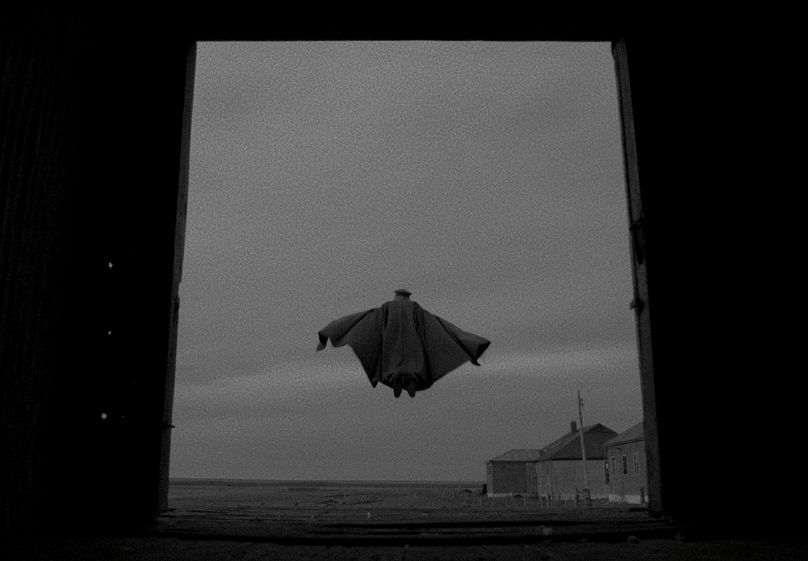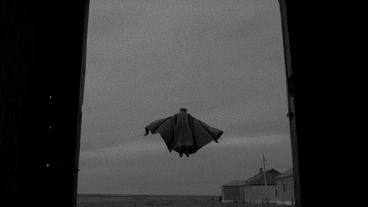Out today on Netflix is Pablo Larraín’s Venice-premiering 'El Conde', a unique and cinematic political farce. It's just a shame most people won't get to see it on the big screen...
“This whole farce began centuries ago – in France, of course.”
Our narrator Margaret Thatcher tells us so, as she guides us through this darkly comedic political horror from Pablo Larraín (Jackie, Spencer). The Chilean director imagines fascist dictator General Augusto Pinochet (Jaime Vadell) as a vampire, who lives hidden in a crumbling mansion. Unlike in real life, he didn’t die in complete impunity in 2006; he has survived until now by faking his own death and by sucking the blood of his victims – with a proclivity for heart bloodshakes and keeping broadly away from workers blood, which tastes “acrid”.
However, after 250 years of life, from the French Revolution to modern day Chile, Pinochet is experiencing something of an existential crisis, one which leads him to stop drinking blood. He’s finally decided to die.
For good this time.
“Why would I want to keep on living in a country that hates me?” he says, questioning the act of living in a world that remembers him as a thief.
His inheritance hungry children on a Succession kick don’t help much either.
However, Pinochet’s final plans may not be so simple, as he suspects that someone is trying to keep him alive. That, and he ends up finding a new lease of life through an unexpected relationship with Carmencita (Paula Luchsinger), an undercover nun-exorcist posing as an accountant to enter the mansion to better take down the tyrant.
There’s plenty to admire about this bold and bloody historical revisionist farce posing as a gothic fairy tale – not least some sumptuous monochrome tableaus featuring a caped figure gliding through the night skies of Santiago, courtesy of ace cinematographer Ed Lachman (The Virgin Suicides, Carol). The batshit Only Fascist Left Alive premise is truly something to be treasured, and there’s more than a hint of Kubrick’s Dr. Strangelove in Larraín and co-screenwriter Guillermo Calderón’s narrative tone – not least in the way the pitch-black humour hits most of its marks.
However, there might not be enough to unreservedly love here, especially if you’re watching on Netflix. El Conde is a cinematic achievement that deserves a theatrical experience, as the score by Juan Pablo Ávalo and Marisol García’s works wonders and the aforementioned black-and-white imagery necessitates a proper big screen projection.
It's also undeniable that the prevalent and graphic violence in the decade-hopping opening act unravels disappointingly fast, leading to a middle section that features repetitive interview segments that are a bit of a chore to get through. This second act lacks some of the inventiveness and impact of earlier scenes, like a young Pinochet (then “Pinoche”) licking the blood off of Marie Antoinette’s guillotine and respectfully decamping with her severed head as a keepsake.
Things do singularly pick up in the last act, which is an absolute blast. Nothing shall be spoiled here, but if you thought the initial set-up was nuts, new characters (who were until then heard but not seen) appear with Freudian motives, and it significantly makes up for some of the mid-section lags.
The lingering snag with El Conde remains that its satirical heft is undermined by an overly zealous, everything-but-the-cardiac-blender approach to the commentary, meaning it all gets a bit messy come curtain fall. You understand what Larraín is getting at with this allegorical cautionary tale stressing history’s bleak tendency to repeat itself. By utilising the vampire myth, the director better highlights how the crimes and tyranny of a symbol of fascism persist through time and don’t just fade with death. Much like vampires. Frustratingly, there’s little shown with regards to Pinochet’s crimes, thereby diluting the possible impact of how brutal his impunity remains, and the critique of the church’s role during the dictator’s rule is undermined by the ultimately wasted character of Carmencita. You wish that the film had fully leaned into Carmencita's narrative potential, or embraced its nutso B-movie credentials a bit more to properly drive a stake through the heart of its political point.
That said, El Conde still draws blood as an aesthetically polished Pinochet panto that's brilliantly grotesque and completely unique. It also features some memorable lines – including Pinochet announcing he’s retiring from the dinner table where his whole family are assembled and assuring his initiable wife Lucia (Gloria Munchmeyer) that he’ll “ride (her) like a bandit’s horse” one last time.
The charmer.
El Conde sits nicely alongside Larraín’s previous (and superior) films Post Mortem, No and The Club, which are also about the tenacious spectre of Pinochet; and while its execution may prove too scattershot for some viewers, you won’t regret sinking your teeth into this one.
El Conde is out now on Netflix.





